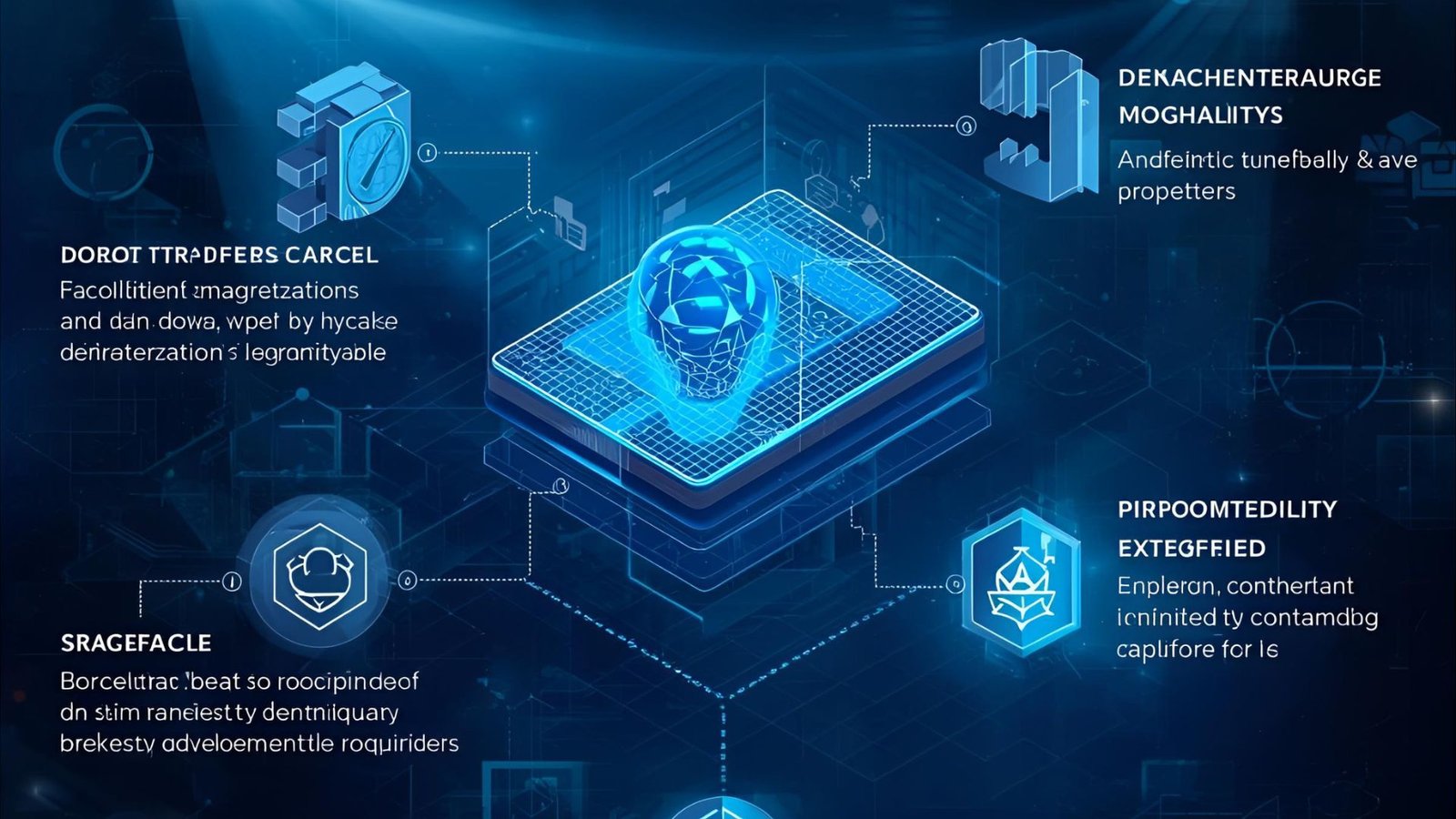Football’s transfer market has long been plagued by opacity, inefficiency, and corruption. From inflated agent fees to murky ownership deals, the current system leaves fans, clubs, and players frustrated. However, a revolutionary technology is poised to change everything: Blockchain Will Transform Football’s operations fundamentally. This groundbreaking digital ledger technology promises to bring unprecedented transparency, security, and efficiency to the beautiful game’s most complex ecosystem. As we stand on the brink of this technological revolution, understanding how blockchain technology will reshape football transfers becomes crucial for every stakeholder in the sport.
The Current State of Football’s Transfer System
Transparency Issues Plague Modern Football
The modern football transfer system operates like a black box, where crucial information remains hidden from public view. Transfer fees, agent commissions, and ownership structures are often shrouded in secrecy, creating an environment ripe for exploitation. Third-party ownership deals, controversial agent interventions, and inflated transfer values have become commonplace, undermining the sport’s integrity.
Financial Complexity and Inefficiencies
Today’s transfer market involves multiple intermediaries, each taking their cut from increasingly complex deals. Banks, agents, lawyers, and various financial institutions all play roles in single transactions, creating layers of bureaucracy that slow down transfers and inflate costs. These inefficiencies not only affect club finances but also impact player welfare and fan experience.
Regulatory Challenges Across Borders
International transfers face additional complications due to varying regulations across different countries and football associations. Currency fluctuations, tax implications, and compliance requirements create further barriers to smooth transfer operations. These challenges often result in delayed transfers, failed negotiations, and frustrated stakeholders throughout the football ecosystem.
How Blockchain Technology Works in Football
Understanding Blockchain Fundamentals
Blockchain technology operates as a distributed ledger system where transaction records are stored across multiple computers simultaneously. Each transaction becomes a “block” that links to previous transactions, creating an immutable chain of records. This decentralized approach eliminates the need for central authorities while ensuring data integrity and transparency.
Smart Contracts Revolution
Smart contracts represent self-executing agreements with terms directly written into code. In football transfers, these digital contracts can automatically execute payments, trigger clauses, and enforce agreements without human intervention. When predetermined conditions are met, smart contracts execute automatically, reducing delays and eliminating intermediary disputes.
Digital Identity and Asset Management
Blockchain enables the creation of unique digital identities for players, clubs, and agents. These identities can store verified credentials, performance statistics, contract histories, and other relevant information in tamper-proof formats. Digital player transfers become more secure and efficient when all stakeholders can access verified information instantly.
Key Benefits of Blockchain in Football Transfers

Enhanced Transparency and Trust
Blockchain transform football transfer processes by making all transactions visible and verifiable. Every transfer fee, agent commission, and contractual detail can be recorded on the blockchain, creating an unprecedented level of transparency. This openness helps combat corruption while building trust among fans, clubs, and regulatory bodies.
Reduced Costs and Intermediaries
By eliminating unnecessary intermediaries, blockchain significantly reduces transfer costs. Traditional banking fees, currency conversion charges, and intermediary commissions can be minimized or eliminated entirely. These savings can be redirected toward player development, facility improvements, or fan experiences.
Faster Transaction Processing
Smart contracts football applications enable near-instantaneous transfer completions. Once conditions are met, payments execute automatically without waiting for manual approvals from multiple parties. This speed reduces uncertainty and allows clubs to complete transfer business more efficiently during limited transfer windows.
Global Standardization
Blockchain provides a standardized platform that transcends geographical boundaries and regulatory differences. A universal system for recording transfers, contracts, and player data could streamline international football operations while maintaining compliance with local regulations.
Real-World Applications and Use Cases
Player Contract Management
Blockchain can store comprehensive player contracts with automatic clause execution. Performance bonuses, appearance fees, and transfer clauses can trigger automatically based on verified data inputs. This automation reduces administrative overhead while ensuring players receive accurate compensation.
Transfer Fee Transparency
Every aspect of transfer fees can be recorded immutably on the blockchain. The breakdown of payments to selling clubs, agents, players, and other parties becomes publicly verifiable, eliminating speculation and ensuring fair distribution of transfer revenues.
Agent Commission Tracking
Agent fees represent a significant portion of transfer costs, yet their exact amounts often remain hidden. Blockchain technology football implementation can track and verify all agent commissions, ensuring transparency and potentially reducing excessive fees through market awareness.
Youth Development Tracking
Blockchain can create permanent records of youth player development, tracking their progress through different academies and clubs. This comprehensive history helps clubs make informed decisions about player acquisitions while protecting young players’ interests.
Current Challenges and Barriers
Technical Implementation Hurdles
Implementing blockchain across global football requires significant technical infrastructure and coordination. Different football associations, leagues, and clubs must adopt compatible systems, requiring unprecedented cooperation and standardization efforts.
Regulatory Compliance Complexity
Football operates under complex regulatory frameworks that vary by country and region. Blockchain Will Transform Football’sinitiatives must navigate existing legal structures while potentially requiring new regulations to address blockchain-specific scenarios.
Industry Resistance to Change
Traditional stakeholders who benefit from current system inefficiencies may resist blockchain adoption. Agents, banks, and other intermediaries might oppose changes that threaten their established revenue streams, creating political barriers to implementation.
Scalability and Performance Concerns
Current blockchain networks face scalability limitations that could impact high-volume transfer periods. The technology must evolve to handle thousands of simultaneous transactions during peak transfer windows without compromising speed or security.
The Future of Digital Player Transfers
Integration with Artificial Intelligence
Combining blockchain with AI could revolutionize player valuation and transfer decision-making. Transfer market transparency enhanced by AI analytics could provide more accurate player assessments while blockchain ensures data integrity and accessibility.
Fan Token Integration
Blockchain-based fan tokens could give supporters voting rights on certain transfer decisions. This democratic approach to football transfer system governance could increase fan engagement while generating additional revenue streams for clubs.
Decentralized Transfer Markets
Future blockchain implementations might create decentralized transfer marketplaces where clubs can directly negotiate deals without traditional intermediaries. These platforms could feature automated matching systems, price discovery mechanisms, and integrated legal frameworks.
Global Player Passport System
A blockchain-based global player passport could store comprehensive player information, including medical records, performance data, and contract histories. This system would streamline international transfers while protecting player privacy and rights.
Case Studies and Early Implementations
Pioneering Football Organizations
Several football organizations have begun exploring blockchain applications. From major European clubs experimenting with fan tokens to smaller leagues implementing digital contract systems, early adopters are paving the way for broader industry transformation.
Technology Partnerships
Partnerships between football organizations and blockchain companies are accelerating development of practical solutions. These collaborations are addressing real-world challenges while building the technical infrastructure necessary for widespread adoption.
Pilot Programs and Testing
Limited pilot programs are testing blockchain applications in controlled environments. These initiatives provide valuable insights into practical implementation challenges while demonstrating tangible benefits to skeptical stakeholders.
Impact on Different Stakeholders
Benefits for Football Clubs
Clubs benefit from reduced transfer costs, faster transaction processing, and enhanced transparency in player acquisitions. Blockchain technology also provides better data management capabilities and improved compliance tracking for regulatory requirements.
Advantages for Players
Players gain from increased transparency in contract negotiations and transfer processes. Blockchain ensures accurate tracking of performance bonuses, appearance fees, and other contractual obligations while protecting their digital identities and career records.
Improvements for Fans
Fans enjoy greater transparency in transfer activities and potentially more involvement in club decisions through blockchain-based voting systems. This technology could also enable new forms of fan engagement and revenue-sharing opportunities.
Regulatory Body Benefits
Football governing bodies gain powerful tools for monitoring compliance, detecting corruption, and ensuring fair play. Blockchain’s immutable records provide comprehensive audit trails that simplify regulatory oversight and enforcement.
Implementation Roadmap and Timeline
Short-term Developments (1-3 years)
Initial implementations will likely focus on specific use cases like contract management or agent commission tracking. Early adopters will test blockchain solutions in controlled environments while building necessary technical infrastructure.
Medium-term Progress (3-5 years)
Broader adoption across major leagues and competitions is expected as technical solutions mature and regulatory frameworks develop. Smart contracts football applications will become more sophisticated and widely accepted.
Long-term Vision (5-10 years)
Complete transformation of the football transfer system through comprehensive blockchain integration. Global standardization, universal player passports, and decentralized transfer markets could become reality during this timeframe.
Also Read: Blockchain in Banking Transforming Payments Trade and Loans
Overcoming Implementation Challenges

Building Industry Consensus
Successful blockchain implementation requires unprecedented cooperation among football stakeholders. Industry leaders must work together to develop standards, protocols, and governance frameworks that benefit all participants.
Technical Infrastructure Development
Robust technical infrastructure must be developed to support global football operations. This includes scalable blockchain networks, user-friendly interfaces, and integration capabilities with existing systems.
Regulatory Framework Evolution
Governments and football governing bodies must develop appropriate regulatory frameworks for blockchain applications. These regulations should protect stakeholders while enabling innovation and technological advancement.
Economic Implications and Market Impact
Transfer Market Efficiency
Blockchain Will Transform Football’s markets by increasing efficiency and reducing friction. More efficient markets could lead to more accurate player valuations and better resource allocation across the football ecosystem.
Financial Transparency Benefits
Enhanced financial transparency could attract new investors and sponsors who value accountability and clear governance structures. This increased confidence might drive additional investment in football development and infrastructure.
Global Market Integration
Blockchain could facilitate better integration between different regional football markets, creating more opportunities for player movement and development across geographical boundaries.
Conclusion
The transformation of football’s transfer system through blockchain technology represents one of the most significant innovations in sports history. While challenges exist, the potential benefits—enhanced transparency, reduced costs, faster transactions, and improved stakeholder experiences—far outweigh the implementation hurdles. As Blockchain Will Transform football operations become reality, stakeholders who embrace this technology early will gain competitive advantages and help shape the future of the beautiful game.
Football organizations, players, agents, and fans must prepare for this technological revolution. The question isn’t whether blockchain will transform football transfers, but how quickly and comprehensively this transformation will occur. Those who adapt to these changes will thrive in football’s digital future, while those who resist may find themselves left behind in an increasingly transparent and efficient marketplace.

